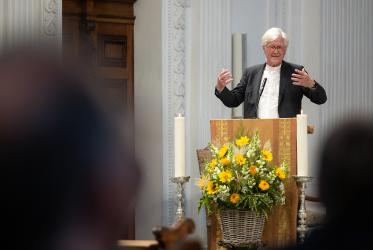The publication – Digital Freedom: The Ten Commandments in Times of Digital Change – is structured around 10 sections, each taking one of the Ten Commandments and exploring its insights for understanding the opportunities and dangers of digital technologies.
“The Ten Commandments reveal new perspectives on digital transformation and ethical insights on how we can shape it,” the chairperson of the EKD council, Bishop Heinrich Bedford-Strohm, writes in a foreword to the publication.
“The prohibition of graven images in the religious context, for example, offers criteria for a human-based approach to image-based digital technologies,” he writes. “Biblical statements about killing, adultery, or bearing false witness offer new perspectives on dealing with autonomous weapons systems, private and intimate relationships in digital space, and the opportunities and dangers of a new communication culture.”
Digital technologies have developed so rapidly over the past decade that social norms on how to deal with them have lagged behind, Bedford-Strohm told a 22 April press conference to launch the new publication.
”This makes it all the more urgent to focus more on the ethical consequences of digitalisation,” he said.
The EKD brings together Germany’s main regional Protestant churches. It is one of the co-organizers of an international symposium on “Communication for Social Justice in the Digital Age” in September, being jointly hosted by the World Council of Churches and the World Association for Christian Communication (WACC).
The 248-page EKD publication (in German) is accompanied by a website www.ekd-digital.de and a social media campaign using the hashtag #EKDigital.
Freiheit digital: Die Zehn Gebote in Zeiten des digitalen Wandels: Eine Denkschrift der Evangelischen Kirche in Deutschland (Leipzig: Evangelische Verlagsanstalt, 2021), available at: https://www.ekd-digital.de/dokumente/denkschrift-freiheit-digital.pdf
The Ten Commandments in Times of Digital Change:
1. Protect and live out freedom as God’s creatures in the digital realm.
I am the Lord thy God, which have brought thee out of the land of Egypt, out of the house of bondage. Thou shalt have no other gods before me. (Ex. 20: 2-3)
2. Understand how the worlds of digital images shape identity and solidarity.
Thou shalt not make unto thee any graven image, or any likeness of any thing . . . (Ex. 20: 4)
3. Be aware of the options for religious communication in the digital world.
Thou shalt not take the name of the Lord thy God in vain . . . (Ex. 20: 7)
4. Give (digital) life a wholesome rhythm.
Remember the sabbath day, to keep it holy. (Ex. 20:8)
5. Make inter-generational relations more equitable digitally.
Honour thy father and thy mother: that thy days may be long upon the land which the Lord thy God giveth thee. (Ex. 20: 12)
6. Stop digitalized violence.
Thou shalt not kill. (Ex. 20: 13)
7. Give space for freedom and respect in intimate relationships in the digital sphere.
Thou shalt not commit adultery. (Ex. 20: 14)
8. Encourage just participation in the digital economy.
Thou shalt not steal. (Ex. 20: 15)
9. Promote truthfulness in the digital world.
Thou shalt not bear false witness against thy neighbour. (Ex. 20: 16)
10. Beware of covetousness in digital space.
Thou shalt not covet thy neighbour's house, thou shalt not covet thy neighbour's wife, nor his manservant, nor his maidservant, nor his ox, nor his ass, nor any thing that is thy neighbour's. (Ex. 20: 17)






